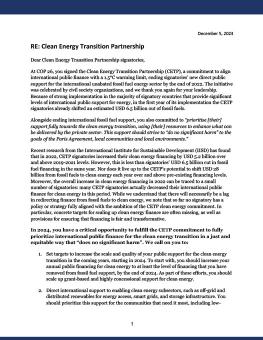
Statement: CETP signatories must stick to their commitment to fully prioritize international public finance for clean energy
One year into the implementation of the Clean Energy Transition Partnership (CETP), research shows that signatories have not yet fully shifted their financing into clean energy. On Energy Day at COP 28, a group of civil society organizations have released a statement calling on CETP signatories to stick to their commitment to prioritize financing for the clean energy transition.
Signatories to the Clean Energy Transition Partnership (CETP) committed to ending new direct public support for the international unabated fossil fuel energy sector by the end of 2022, and instead prioritize their support fully toward the clean energy transition.
However, recent IISD research reveals that while signatories to the CETP have made significant progress in cutting international public finance for fossil fuels, most countries and institutions have not yet matched these cuts with equal increases in support for clean energy. In 2022, signatories collectively reduced their fossil fuel financing by USD 6.5 billion compared with the 2019–2021 average, but put only an extra USD 5.2 billion into clean energy—and this increase was due to a small handful of signatories.
In the statement, the civil society organizations emphasize that CETP signatories have a critical opportunity to fulfill their commitment to fully prioritize international public finance for the clean energy transition in a just and equitable way that "does no significant harm."
The signatories of the statement call on the signatories to the CETP to
- set targets to increase the scale and quality of public support for the clean energy transition;
- direct international support to enabling clean energy subsectors, such as off-grid and distributed renewables for energy access, smart grids, and storage infrastructure;
- ensure that all clean energy financing is rights based, community led, gender sensitive, and implemented through democratic and participatory processes;
- update national and institutional policies and strategies to prioritize international support for clean energy in 2024; and
- annually report publicly on progress in increasing international public finance for clean energy.
Participating experts
You might also be interested in
December 2024 | Carbon Minefields Oil and Gas Exploration Monitor
In November 2024, 23 oil and gas exploration licences were awarded across five countries, with Russia granting the licences that account for the largest portion of embodied emissions.
Increased Support Needed to Achieve India's Clean Energy Goals
India is on track to achieve many of its 2030 clean energy goals but needs to step up government support measures to accelerate the deployment of offshore wind, electric vehicles, and green hydrogen, according to a new report.
Budgeting for Net Zero
This study estimates the cost gap for battery energy storage systems (BESSs), offshore wind, solar photovoltaic (PV), electric vehicles (EVs), and green hydrogen (GH2) to inform government support.
Ending Export Credits for Oil and Gas: How OECD countries can end 2024 with a climate win
For a year now, Organisation of Petroleum Exporting Countries (OECD) governments have been negotiating an agreement that could put an end to oil and gas export finance. Following the acrimony in Baku, this would be a very real way for the OECD to show policy coherence, respond to calls from the poorest countries to stop subsidizing fossil fuels, and shift public finance to solutions.